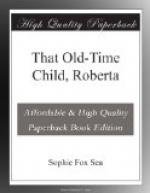“Yes,” the child was reluctantly forced to admit. Suddenly her face brightened; she almost trembled with eagerness. “Who stole my mamma’s negroes, I wonder; every one of them but Mam’ Sarah, and Aunt Judy, and Uncle Squire, and Polly and Dilsy—every one; who did that?”
That sally provoked such a peal of laughter and put everybody in such a good humor, possibly the search was not prosecuted as vigorously as it might have been otherwise.
The next morning about sunrise two Federal soldiers sat on their horses before Mrs. Marsden’s front door. The family were assembled on the porch. They were always early risers, and their being up a little earlier than usual would have caused no comment. Possibly the leave-taking might have seemed a little queer to prying eyes.
“Take care of my gun,” the youngest-looking of the soldiers whispered to Roberta, “and if I live, I’ll come back before long and get it.”
“Will you?” said the child, delightedly. “Then I’ll take care of it, sure.” An instant afterwards added, with the serio-comic imitation of the fire of older tongues, so common at that time, “They will have to walk over my dead body before they take it from me.”
As the soldiers rode through the avenue the murkiness overhead cleared, and shafts of clear gold fell earthward; each blade of grass sparkled like a diamond, and tiny globules hung from the leaves of the trees, reflecting countless dazzling prisms of light. A lark started up from the high grass of the meadow, and soared aloft, dropping soft trills and quavers and clear, fresh warbles from his happy little throat. Just outside of the avenue gate they met a line of milch-cows en route for the “cuppen.” They moved swiftly as though there was purpose in their movements, and glanced about with eager eyes. Slender streams of milk flowed from their swollen teats, and marked their passage along the road-side. In barnyards near calves were waiting, frantic to get at those same swollen teats. The black boy who had them in charge opened the avenue gate for them, then stood and looked after the soldiers, the very embodiment of shrewd, impish humor. Hands burrowing in his pockets; his body, from the waist up, thrown back; his mouth stretched in a broad grin, and indeed every feature replete with fun. When they passed out of ear-shot, he put his thumb on the end of his nose, and bawled out: “It’s all in my eye, Betty Martin,” and wound up by turning somersaults on the grass by the roadside.
Later on the sun glared like a great ball of brass. Anon a light breeze sprung up with a breath of moisture in it.
“That’s good,” said the oldest soldier, taking off his cap and baring his forehead to it; “that’s good. ’Twill make more bearable the rays of yonder heater.”
Their bodies were refreshed and spirits hopeful in proportion. They did not converse much; seemed to be taken up with noting the country, as though comparing it with some memoranda retained in recollection only. They were evidently strangers to that locality, for they relied for direction upon milestones and the sign-posts that appeared at intersecting roads. At last, when they had passed over about ten miles, they came to an Irishman beating rock by the roadside.




